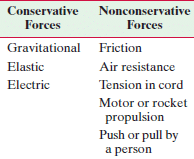Difference between conservative and non conservative force with examples
Conservative forces are those forces for which work is done depending only on the initial and final points, while Non-Conservative forces are those forces for which the work is done or the kinetic energy depends on other factors such as velocity or the particular path taken by the body.
Common examples of conservative force are, Gravitational forces, Magnetic force, Electrostatic force, Elastic spring force, and Electric force, while frictional force, air resistance force, and the force of gravity are nonconservative force examples.
What are conservative forces?
Conservative forces are the forces with the property that the total work done in moving a particle between two points is independent of the taken path. Equivalently, if a particle travels in a closed loop, the total work done is the sum of the forces acting along the path multiplied by the displacement by a conservative force is zero.


Conservative force examples
- Gravitational forces
- Magnetic force
- Electrostatic force
- Elastic spring force
- Electric force
what are non conservative forces?
The force is called non-conservative if work is done by the force and is dependent on the path followed by the body. oR The forces that are not conservative are called non-conservative forces. The work done by the non-conservative force depends on the path followed by the object.
non conservative force examples
- Frictional forces
- Viscous forces
- Induction forces
- Air resistance force
- Tension in a string
- Normal force
- Propulsion force of the rocket
- Propulsion force of the boat
Visit our Page for Related Topics: Mechanics
conservative forces vs non-conservative forces
| Conservative forces | Non conservative forces |
| The force is called conservative if work done by the force is the dependent only the initial and final position of the body does not depend on path followed by the body. | The force is called non-conservative force if work is done by the force is dependent on the path followed by the body. |
| The work done by the conservative force in the closed path is zero. | The work done by the non-conservative force in a closed path is not zero. |
Related Topics:
Related Post
Recent Posts
Is energy quantized in classical physics?
No, according to classical wave theory the emission of electromagnetic radiations from the surface is…
Types of laser
Basically, there are four types of laser which includes: Gas Lasers Solid State lasers Liquid…
Ultrasound frequency range
What is ultrasonics? The study and application of mechanical vibrations with frequencies beyond the limits…
Electromagnetic Energy: What are some examples of it?
Electromagnetic energy definition Electromagnetic energy is the amount of energy stored in a region of…
Fundamental units and Derived Units with Examples
The Main Difference between fundamental Units and Base units is that Units that Express base…
Newton’s First law of Motion Examples in Our Daily Life
Newton's first law of motion states that " A body continues its state of rest…